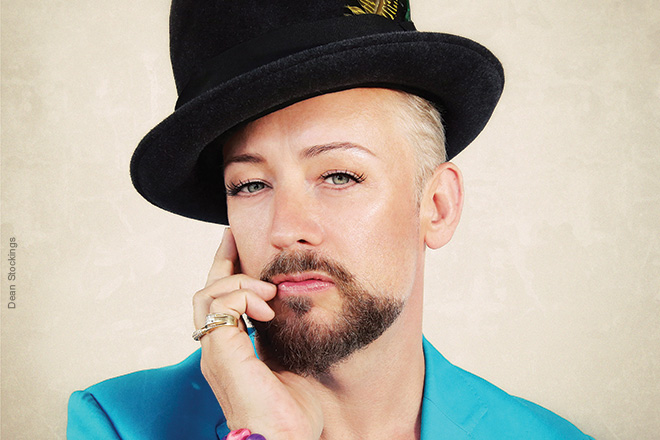BOY GEORGE
The colorful ’80s icon returns with a new perspective
“When you’ve lived a dramatic life, you’ve got a lot to draw from,” Boy George says with a laugh. As the lead singer of Grammy-winning band Culture Club, he’s sold more than 20 million albums powered by megahits like “Karma Chameleon” and “Do You Really Want to Hurt Me.” But after dominating radio in the mid-’80s, the band’s red-hot streak cooled as the decade ended. Once the darling of new wave, Boy George found himself replaced by what he called “formulaic and unoriginal” material. “I’d be invited to cut the cake at the Radio 1 birthday party, but they wouldn’t play me on the radio,” he muses. “It was time to get off the roller coaster.”
Though he abandoned his pursuit of pop stardom, Boy George continued to experience ups and downs associated with life in the spotlight. While traveling the world as a DJ, he endured well-publicized battles with heroin and cocaine addiction and served time in prison in 2009 for assault and false imprisonment.
Now on the comeback trail, Boy George, 52, has just released his first full-length album in 18 years, This Is What I Do. The long gap between releases gave him fresh perspective on his time in the limelight. “I’m comfortable now and have a very different relationship with myself,” he says. “Back then there was a lot of emphasis on how I looked. I would forget about what I was.”
Consisting of a dozen original songs, This Is What I Do spans the musical map from glam rock to reggae. “Hybrids are more interesting,” he says. “My music has always been eclectic. I tend to go back to older things I love. It’s like my attitude toward clothes—I like the well-made and traditional.” While recording, he recalled his boyhood years listening to the radio. “There were lots of different styles and fewer rules,” he says. “You’d go from listening to the Carpenters to the Sex Pistols. It was the soundtrack to my life.”
In the studio, Boy George enlisted the help of three longtime friends, musicians John Themis and Kevan Frost, and producer Richie Stevens. The laid-back atmosphere lent itself to collaboration and creativity. “It all began with the groove, and that set the mood,” he says. “The recording was more traditional and organic.”
Boy George speaks frankly about topics such as sexuality and religion through his music. “I’ve never had a fixed opinion. I always had a lot of questions,” he says. “As a gay man, my songs naturally have a different slant to them. I try to embrace those people and tell them to take ownership of who you are.”
–Blake Boldt
Subscribe to M Music and Musicians. $12 for one year >>




comment closed